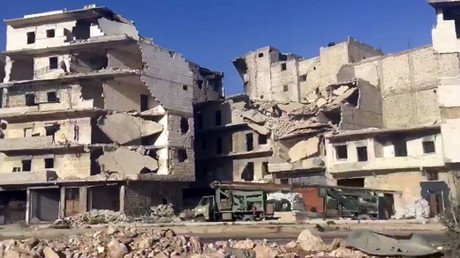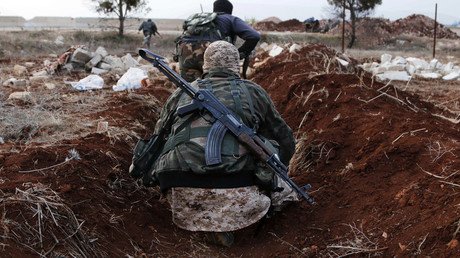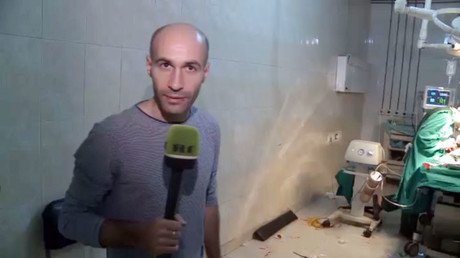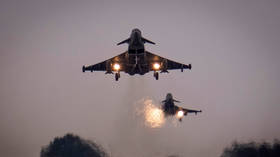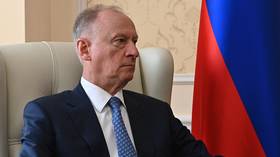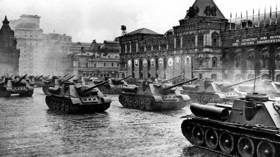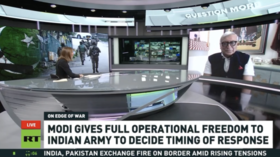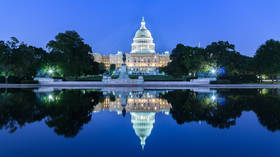Aleppo trap: Rebel-held East on lockdown, civilians blocked off from govt-controlled areas
Militants controlling eastern Aleppo have now completely barred residents from leaving the area and crossing to government-controlled districts under threat of shelling, using them as a human shield against the army. An RT crew witnessed the hostage crisis.
“East Aleppo is on total lockdown. Nobody is allowed in or out – not the sick, not women, not children,” RT’s Murad Gazdiev reports from the checkpoint in the Bustan al-Qasr district, the one that the Red Crescent tried to use to deliver aid to East Aleppo only recently, but were refused. All seven checkpoints between eastern and western Aleppo have now been sealed by rebels, mined and barricaded to prevent anyone from crossing over.
RT's crew visited three of the seven checkpoints and spoke to those on the western side whose relatives have been locked behind the rebels’ fortifications.
“My uncle and three cousins are living in eastern Aleppo. The last time I saw them was a year ago. The rebels don’t let them leave the area,” a boy RT crew caught up with near one of the checkpoints on the government-held side said.
“The rebels are using my relatives within eastern Aleppo as a human shield,” a man in Salahuddin district told RT. Not only people are not allowed to leave, they are prohibited any means of communication with the other side.
“I have a few relatives living in the rebel-held area. There are lots of civilians there and the rebels are using them as a human shield. I haven’t been able to get in touch with my relatives. The rebels don’t allow any communication between the two sides of the city,” another resident of western Aleppo recounts.
#Aleppo checkpoint tour: in two weeks, we haven't seen a single civilian who'd been let out by rebels. And we check daily. Full report on RT pic.twitter.com/sS51NBvPxF
— Murad Gazdiev (@MuradGazdiev) October 15, 2016
On Thursday, chief of the main operations department of Russia’s General Staff, Sergey Rudskoy, confirmed that terrorists block humanitarian aid delivery for the civilian population and said that all humanitarian corridors have been booby trapped by them.
Fighting in Aleppo escalated after the September 12 ceasefire collapsed with the Syrian Army having managed to encircle militants in its eastern districts. But this has pushed the rebels to barricade themselves within them – along with residents, as the Syrian Army will not be able to attack the districts with full might when there is a risk so many civilian lives could be lost.
“To reduce losses, commanders of the armed groups locate their command posts, warehouses and other facilities on the first floors of residential buildings. Their residents continue to be held captive by militants inside the buildings, acting as ‘human shields,’” General Rudskoy stated.
“These egregious facts remain without attention from western countries. They neither want to notice any crimes by the militants nor respond to them.”
The Syrian Army has been saying that even while building their fortifications, the rebels cowered behind civilians, pushing them on the frontline so that the government troops do not fire at them.
“We cannot stop the process of construction of the enemy fortifications, as they pushed people right on the frontline. To avoid deaths of women and children there, we have suspended the work of snipers and mortars,” one Syrian Army commanders told RIA News agency earlier this week.
Last week, UN envoy for Syria, Staffan de Mistura, warned that East Aleppo might be destroyed within two months if the military action in the city continues and urged Al-Nusra militants to leave the city. Russia supported the proposal.
“In the first place, those who don’t leave with ‘Nusra’ should clearly separate themselves [from it], on paper, officially sign such a commitment,” Russian Foreign Minister Sergey Lavrov said.
“Maybe then the government law enforcers and this armed opposition will be able to form some kind of joint law-and-order bodies to ensure normal life, so that people would feel safe,” Foreign Minister Sergey Lavrov said.
East #Aleppo on total lockdown; rebels have mined & barricaded all 7 civilians crossings. This is the biggest hostage crisis in the world. pic.twitter.com/OyRYVX62BM
— Murad Gazdiev (@MuradGazdiev) October 14, 2016
The Russian military offered to secure the corridor for the rebels to exit Aleppo, established back in July by the Syrian Army and the Russian Reconciliation Center.
“The Syrian government guarantees safety to the armed people who decide to withdraw from eastern Aleppo with personal weapons into other areas of the country of their choice,” General Rudskoy said, noting, however, that so far the militants prefer to stay within their barricades, shelling frontline neighborhoods of Western Aleppo with mortars and self-made rockets.
On Thursday, a school and adjacent bus stop were hit by mortar shells in the government-controlled Al-Suleymaniya neighborhood of Aleppo. At least seven children came under fire, five of whom were killed.
“Militants from terrorist groups are continuing their attacks on the positions of government troops in the north and south of [Aleppo] to break through encirclement and restore the weapons supply routes of the armed groups operating in the Eastern districts of Aleppo,” Rudskoy said.
Russia and the US, the two co-chairs of the International Syria Support Group (ISSG), created to help stop the conflict in the Middle Eastern country, are to meet in Lausanne, Switzerland later on Saturday. It comes nearly two weeks after Washington said it was suspending bilateral cooperation with Moscow following a failed attempt to introduce a ceasefire in the country.
On Friday, Foreign Minister Lavrov said that the renewal of the ceasefire depends on whether stakeholders will be willing to live up to UN Security Council resolutions calling for an end to the violence and humanitarian access provision, along with the resumption of a political process. Senior US and Russian officials, however, expressed skepticism this week that the talks will achieve any major breakthroughs, as there is still much finger-pointing between the two co-chairs.
The US claims Russia did not deliver on a promise to make sure Damascus suspended its military campaign and provide humanitarian access to besieged areas of Syria, while Russia accuses the US of failing to separate the rebels under its control from terrorists and organize the withdrawal of militants from Castello Road to allow humanitarian aid supply to Aleppo.
International human rights expert Daniel Kovalik questions the true reasons for US interference with the Syrian crisis in the first place and says that in order for Syria to ever see peace, America should withdraw itself from this crisis altogether.
“The US has no rational policy in Syria, has no rational plan for the Syrian people. For the US to be claiming that they want democracy in Syria – it just does not ring true. They are more content with no government [in Syria] at all [to] create a situation of chaos like in Libya where they feel they can [be sure] Syria isn’t having any influence in the region at all,” Kovalik told RT.
“The US has talked out of both sides of its mouth claiming ‘we want to fight [Islamic State], we want to fight Al-Qaeda,’ while frankly providing support to groups… directly working with those. So I definitely think we’ve been part of the problem and… we really are not capable of being part of the solution. Our only role at this point is to start disengaging militarily from the Middle East - I think we’ve made a mess of it.
Frankly, we need to leave the Arab world to the Arabs,” he added.
